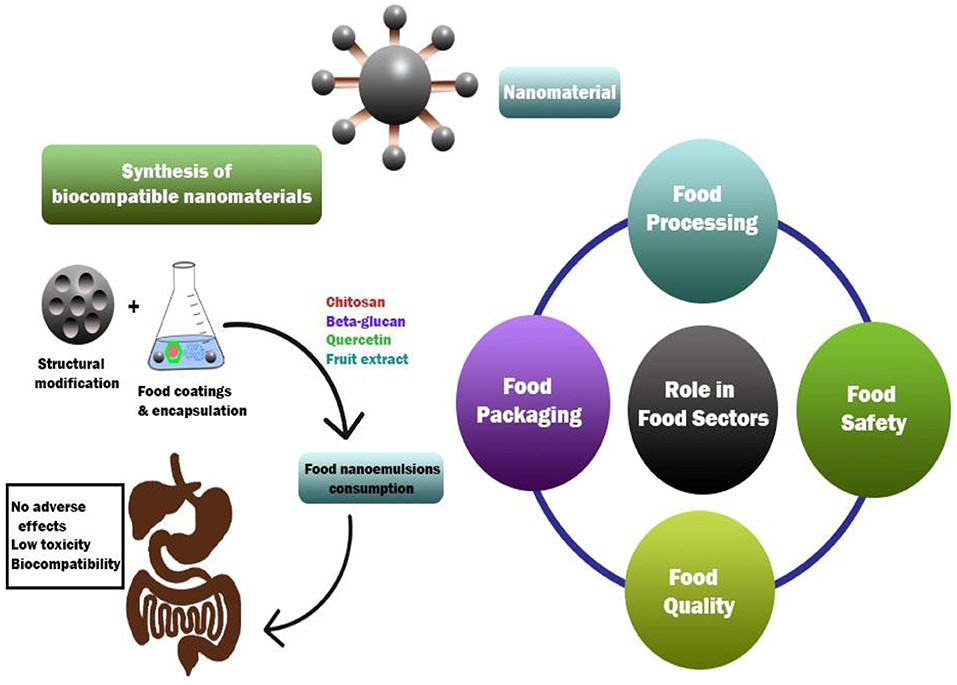CD Bioparticles is a leading manufacturer and supplier of a wide range of active ingredient delivery products, including metallic nanostructures, biomacromolecules, biopolymers & synthetic polymers, and lipid systems, for development and commercialization in a variety of application areas. We have also developed well-established delivery technology platforms such as inorganic nanomaterials, biomacromolecules, polymers and lipid systems. In addition, we can provide a wide range of custom services, including nanoparticle formulation for food drug delivery, bioparticle analysis and characterization, and drug targeting strategies. We are committed to providing the most comprehensive product listings and fit-for-purpose custom analysis and synthesis services to academic as well as industrial researchers and assay developers around the world.
 Figure 1. Graphical abstract of functions of biocompatible nanomaterials in food industry. (Ranjha MMAN, et al.; 2022)
Figure 1. Graphical abstract of functions of biocompatible nanomaterials in food industry. (Ranjha MMAN, et al.; 2022)
In the ever-evolving landscape of the food industry, innovative technologies are continually being explored to enhance product quality, safety, and nutritional value. One such groundbreaking area of research is the utilization of nanoparticles in food products. Nanoparticles, with dimensions on the nanometer scale, have shown promising potential to revolutionize various aspects of the food industry. Among these advancements, liposome health products stand out as a prime example of how nanoparticles are reshaping the way we approach nutrition.
Nanoparticles, due to their small size, offer unique properties that can be harnessed to improve the texture, taste, and even the nutritional profile of food products. These tiny particles can interact with ingredients on a molecular level, allowing for enhanced delivery of nutrients, improved solubility, and controlled release of bioactive compounds. This has far-reaching implications for both consumers and producers alike.
Liposomes, a specific type of nanoparticle, have gained considerable attention in the food industry for their ability to encapsulate and deliver bioactive compounds. These microscopic lipid bilayer spheres can carry nutrients, vitamins, and other health-promoting substances, protecting them from degradation and improving their absorption in the body. Liposome health products have found their way onto store shelves in the form of supplements, functional beverages, and fortified foods.
Take, for instance, vitamin supplements. Liposomal formulations of vitamins have been shown to enhance their bioavailability, ensuring that the body can absorb and utilize these essential nutrients more effectively. This innovation holds promise, especially for individuals with specific dietary restrictions or those seeking optimal nutrient absorption.
Furthermore, liposome technology has enabled the creation of functional beverages that go beyond traditional thirst-quenching. Imagine a beverage infused with curcumin, the active compound in turmeric known for its anti-inflammatory properties. By encapsulating curcumin within liposomes, its bioavailability is enhanced, allowing consumers to potentially experience greater health benefits from the same amount of curcumin compared to conventional forms.
As nanoparticles make their way into the food industry, questions about their safety and regulatory approval have arisen. Ensuring that these innovative products are safe for human consumption is paramount. Regulatory bodies around the world are actively evaluating the use of nanoparticles in food, setting guidelines and standards to guarantee consumer protection. Manufacturers must navigate these regulatory landscapes diligently, conducting rigorous testing to demonstrate the safety of their nanoparticle-based products.
While liposome health products represent a remarkable advancement in nanoparticle utilization, the potential of nanoparticles in the food industry extends beyond encapsulation. Researchers are exploring ways to incorporate nanoparticles directly into food matrices to enhance texture, flavor, and shelf life. For example, nanoparticles can be used to create smoother textures in dairy products, improve the stability of emulsions in salad dressings, and even extend the freshness of baked goods.
CD Bioparticles specializes in the development of in vivo delivery systems and utilizes our core technologies to customize nanocarriers for in vivo delivery of various substances. With our high-quality products and services, your conveying efficiency can be greatly improved.
We provide custom synthesis of nanoparticles for the food and pharmaceutical industries. Customers can select material type, particle size, size distribution, and surface functionality. We enable you to generate new insights and breakthroughs in the nutritional delivery of foods. Furthermore, the method of developing nanoparticle formulations for the production of nanofood or health products is simple, scalable, and reproducible, which is ultimately suitable for large-scale manufacturing.
References
1. Download the template.
2. Enter product information on the template (maximum number of products: 200).
3. Load the file using selector below.
1. Download the template.
2. Enter product information on the template (maximum number of products: 200).
3. Load the file using selector below.